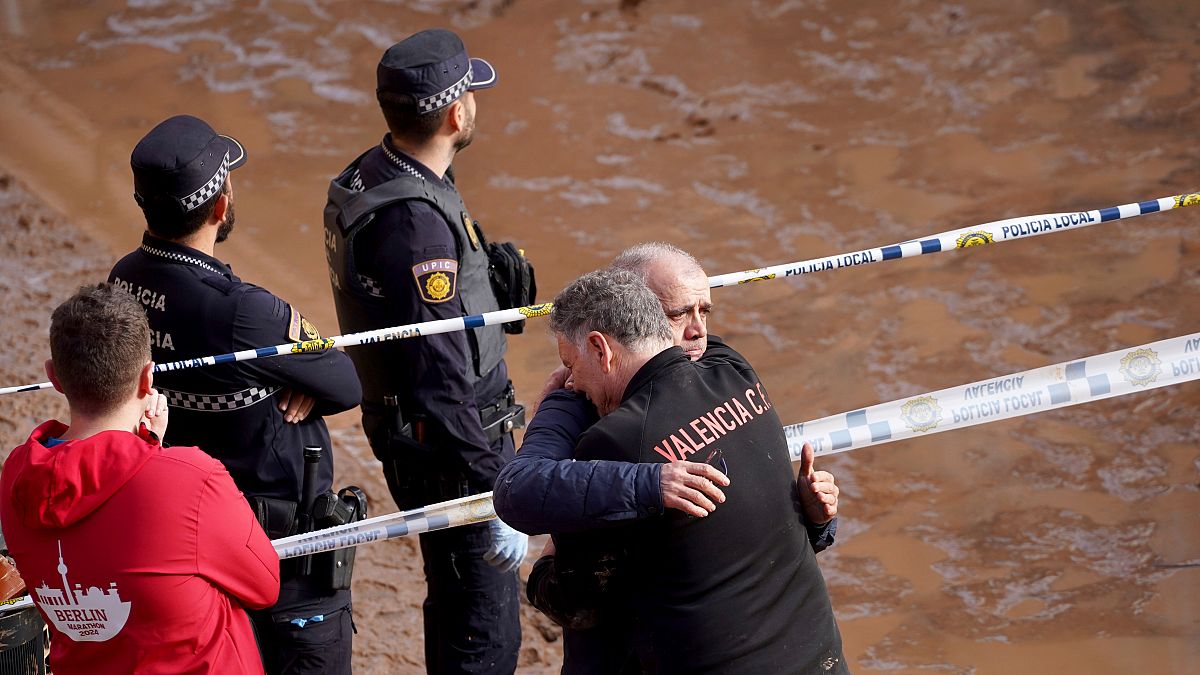Over 1,200 soldiers from Spain’s emergency rescue units have joined regional and local emergency workers in the search for bodies and survivors, with Spanish authorities saying the death toll is likely to rise.
The Spanish government is deploying hundreds more soldiers to distribute essential aid after devastating flash floods killed over 150 in the country’s worst natural disaster in decades.
Torrential rain and hailstorms on Tuesday caused flooding across multiple regions including the hardest-hit eastern province of Valencia, turning streets into rivers that ripped into the ground floors of homes and washed away cars and people.
By Thursday afternoon, regional authorities in Valencia released an updated preliminary death toll, stating it had reached 158 victims.
Another two were found dead in neighbouring Castilla-La Mancha and one in Málaga. Dozens more are still missing, authorities say.
More than 1,200 soldiers from Spain’s emergency rescue units have joined regional and local emergency workers in the search for bodies and survivors. Defence Minister Margarita Robles told the Cadena Ser radio station that the death toll is likely to rise.
Mourning period
Spanish Prime Minister Pedro Sánchez pledged the government’s full support to the areas affected by devastating floods, as he visited Valencia on Thursday.
He urged people to remain at home, saying the situation remained unstable.
Sánchez said the priority was finding those who were missing and pledged all necessary resources for as long as it takes to help with both the immediate needs of the affected areas and reconstruction.
He added that he had spoken to European Commission president Ursula von der Leyen who had offered the EU’s assistance, and said member states had also stepped up to offer resources.
Spain’s transport minister says that dead bodies are in some of the hundreds of stranded vehicles.
King Felipe VI expressed his condolences to the affected families and warned of the “enormous destruction” of infrastructure and possessions as a result of the storm.
European Commission President Ursula von der Leyen told reporters in Brussels that the EU will “help coordinate the rescue teams” using its Copernicus geo-monitoring satellite system.
Thousands of people in Valencia were left without water and electricity and hundreds were stranded after their cars were wrecked or roads were blocked. The region remained partly isolated, with several roads cut off and train lines interrupted, including the high-speed service to Madrid, which officials say will not be repaired for several days.
A high-speed train with nearly 300 people on board derailed near Malaga on Tuesday, although rail authorities said no one was hurt. Many flights were cancelled or diverted on Tuesday and Wednesday in various airports, but normal services have since resumed.
Delayed warnings criticised
In interviews with Spanish broadcasters and posts on social media, residents of the Valencia region have questioned a lack of preparedness by the authorities.
The regional government has been criticised for not sending out flood warnings to people’s mobile phones until 8 pm local time on Tuesday, by which time several towns and villages had already been flooded for hours.
Spain’s national weather service AEMET said it rained more in eight hours in Valencia on Tuesday than it had in the preceding 20 months, calling the deluge “extraordinary”.
The country has experienced similar autumn storms in recent years, but they pale in comparison with the devastation wrought over the last two days.
The current death toll is the worst caused by flooding in Europe since 2021, when at least 243 lives were lost in Germany, Belgium, Romania, Italy and Austria. It is believed to be the worst flooding disaster in Spain since 1973, when more than 150 people were estimated to have died in floods in the southeast.
AEMET said the flash floods are a result of a gota fría, or cold drop, which occurs when cold polar air moves over the warm water of the Mediterranean Sea. Scientists say worsening extreme weather events are likely caused by climate change.
Additional sources • AP

